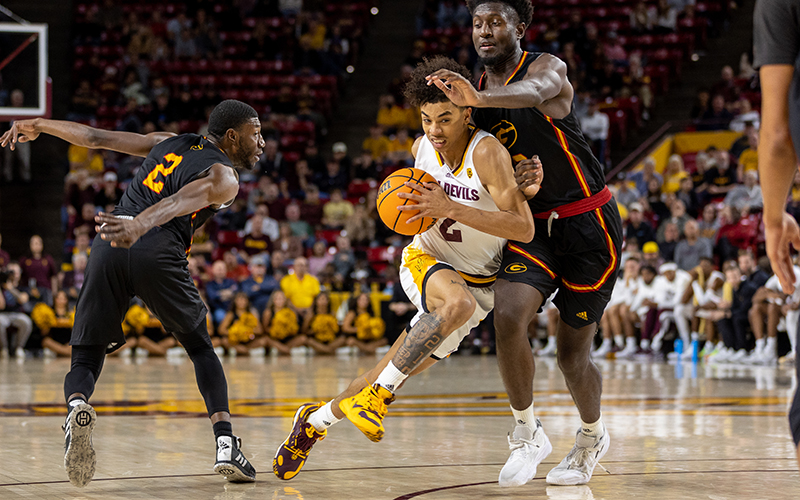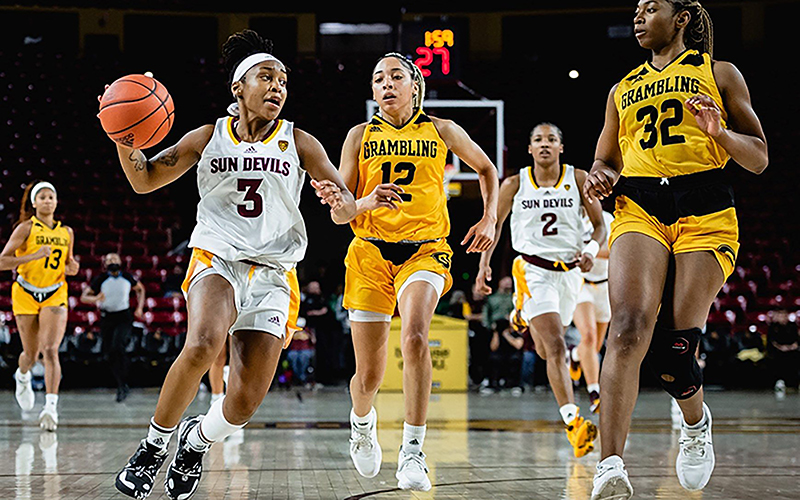
Austin Nunez, center, and his Arizona State teammates had the opportunity to learn more about HBCUs when the Sun Devils played Grambling State Tuesday night. (Photo by Mary Grace Grabill/Cronkite News)

ASU women’s coach Natasha Adair said before her team’s game Grambling State that she was excited “just to merge two teams, two experiences. It’s just a great opportunity for us to learn, grow and then just grow together as one.” (Photo courtesy of Sun Devil Athletics)
PHOENIX – The Arizona State women’s basketball team was set to play against Grambling State in 2020 before travel restrictions during the coronavirus pandemic forced the game to be canceled, according to GSU coach Freddie Murray.
Two years later, an opportunity appeared for the schools to play each other. This time, though, it came from a unique partnership between the Pac-12 Conference and the Southwestern Athletic Conference, a league of historically Black colleges and universities, built on educational experiences for athletes.
The collaboration resulted in the formation of the Pac-12/SWAC Legacy Series. The series, announced in September 2021, aims to provide athletes with education surrounding social justice issues in addition to creating a platform for competition between the two conferences.
Each men’s and women’s basketball program in the Pac-12 will take part in a home-and-home series starting this season as part of the four-year partnership. The men’s and women’s basketball programs at ASU and Arizona were all selected to take part in the first two-year cycle of the series.
The ASU women’s basketball team hosted Grambling State on Nov. 11 as part of the series, defeating the Tigers, 62-49. Though the Pac-12 has not officially announced the timing, the Sun Devils will eventually travel to Grambling State to complete the home-and-home series.
Murray, who graduated from Jackson State in 1990, said understanding the historical context of HBCUs is important.
“What a lot of people don’t realize is that HBCU was actually derived from African Americans not being able to actually go to American schools, to where they had to pretty much start their own schools,” he said to Cronkite News.
Murray, who has risen through the coaching ranks at multiple HBCUs, added that HBCUs have “always been ahead of a lot of the social issues that have plagued our society, and we’ve been dealing with it for over 100-plus years now.”
For many SWAC programs, the Legacy Series provides either rare or first-time opportunities to host schools from a power conference. The originally planned meeting in 2020 between ASU and GSU was set up as a guarantee game, Murray said.
Guarantee games give less-affluent programs a chance to earn money while traveling to play against bigger schools, usually from a Power Five conference like the Pac-12.
This game felt much different than a typical guarantee game, starting with both teams sharing dinner together Wednesday night after the Tigers arrived in Arizona.
“For the most part, teams usually show up, practice and compete the next day,” Murray said of a typical road trip. “It was great to be able to have a down day to do something and a day in between playing the game.”
Murray appreciated the opportunity to educate ASU players and officials about HBCUs.
“At the end of the day, we’re all in this together, whether we’re Black, whether we’re white, whether we’re Chinese or whatever race it is, we’re all in this together,” Murray said. “But, HBCUs have always been at the forefront of a lot of the social justice or social issues that have plagued this society.”
The dinner was also a chance for him to catch up with ASU women’s coach Natasha Adair, as the two had become friends over the years of coaching against each other.
Adair, whose son attended the HBCU Johnson C. Smith University, said before the game that she was excited “just to merge two teams, two experiences. It’s just a great opportunity for us to learn, grow and then just grow together as one.”
Adair has long advocated for social justice issues. Before the Nov. 8 election, she posted on social media and encouraged everyone to get out and vote.
?✅??#VOTE pic.twitter.com/9LXKYkrxoa
— Natasha Adair (@CoachAdair) November 8, 2022
“These are rights that for so long we weren’t able to (have) and our young people … have such a strong voice,” Adair said. “(I’m) just really encouraging our players to use their voice and use their platform because what laws that are being passed now affect them more than anything.
“And so we want to make sure that we educate them, we empower them, and that we give them those opportunities to exercise their vote and just to make a difference and make a change.”
In the summer of 2020, while Adair was coaching at Delaware, she talked with her team, and together they decided to send letters to advocate change to mayors across the state. They “crafted a document that, among other things, called for more thorough psychological examinations when hiring police officers, a ban on chokeholds and the type of restraint that killed (George) Floyd, and funding for body cams for officers,” according to a team release.
The entire team signed the letter and Adair passed it along to “Director of Intercollegiate Athletics and Recreation Services Chrissi Rawak, who tasked Gino Gradkowski, the Assistant Director for Student Services Leadership, with making sure the letter got in front of UD’s government and community relations team.”
The women’s basketball team then joined together with Delaware football, volleyball and swimming & diving athletes and advocated their cause in a face-to-face meeting with the Attorney General of Delaware, Kathy Jennings, and were joined via Zoom by John Carney, the Governor of Delaware.
“The next day, Carney signed Executive Order #41, which bans the use of chokeholds by State of Delaware law enforcement agencies, increases community engagement, requires additional de-escalation and implicit bias training, and increases the availability of crisis intervention services for law enforcement officers. The Delaware General Assembly passed a bill banning chokeholds on the same day,” the release said.
Adair, with her past advocacy in mind, recognized the importance of the Legacy Series after the Nov. 11 matchup.
“It stands for more than just basketball, (coaches) have a responsibility, especially on this big stage, to make sure we’re not just coaching them on the court,” Adair said. “We’re coaching them and preparing them for life, and they will be able to grow as women and be empowered to speak up for things that they are passionate about and things to affect change in society. So, I think it’s really needed and (I’m) just thankful to be a part of the conference that thought so, (too).”
Added ASU junior guard Tyi Skinner: “Obviously we don’t go to a HBCU, we go to a PWI (predominantly white institution), (but) we’re still young Black women, and it’s important to know those things in life. So I think the collaboration was great because it’s more than just on the court, off the court.”
Before Arizona men’s basketball hosted Southern on Nov. 11 for its Legacy Series game, Southern graduate Brandi James talked with the Wildcats to educate them about HBCUs.
“It was really special because I didn’t even know like it’s a thing,” said Kerr Kriisa, a junior point guard who hails from Estonia. “I got smarter, our team got way smarter. It’s pretty impressive and super cool. It was fun to be part of this game and for sure, I’ll remember this game.”
It was our honor to have Brandi James talk to our team after practice yesterday.
She is a Southern University alum that currently works at Raytheon in Tucson. She talked about her experience at Southern and the importance of HBCU's.#PAC12SWAC #BearDown pic.twitter.com/Y23Yd8kt6N
— Arizona Basketball (@ArizonaMBB) November 12, 2022
Arizona men’s coach Tommy Lloyd offered appreciation and respect to SWAC schools after the Wildcats’ victory over the Jaguars.
“Those programs have to overcome long odds in the Division I basketball business landscape,” Lloyd said. “I mean, obviously, they’re probably not as well-funded as programs like we are, and they got to go out and play all these road games. … But, the cool thing for them is next year, they get us back there on the second game of the year. So, I think it’ll probably have a little more meaning and impact when we get to go back there and have that full experience. And we’re looking forward to it.”
When Arizona travels to Southern next season, it will mark Southern’s first men’s basketball home game against a Pac-12 school.
“I was fortunate to have a home game this year in that deal,” Lloyd said. “But next year, the shoe’s on the other foot, so we gotta go respond to (and) answer the bell.”
Arizona women’s basketball will play its Legacy Series game at home against Texas Southern on Dec. 14.
The Arizona State men’s team, meanwhile, played on the road this season. ASU lost in overtime to Texas Southern on Nov. 13. The game marked the first time in 29 years Texas Southern hosted a Pac-12 school.
Murray hopes similar partnerships, like the Pac-12 and the SWAC’s current one, will be formed in the future.
“To be able to bring two major conferences together, I think it was a monumental opportunity to be the first to do it, and hopefully others will follow up on it,” Murray said.


